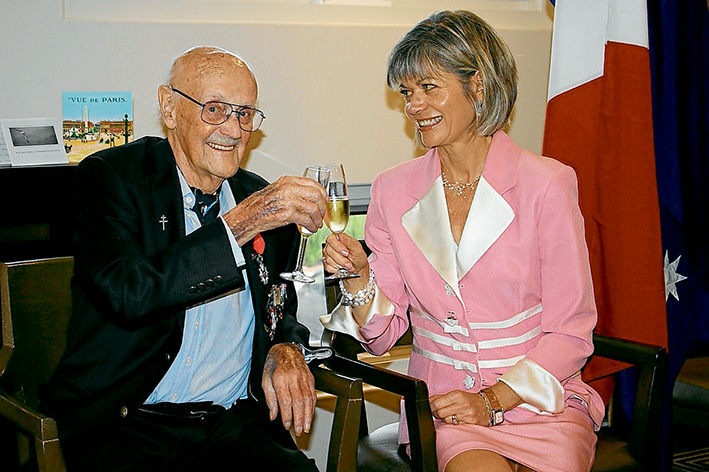
WORLD War II survivor Keith Stevens once remarked that he did not get too upset when things went wrong in business, or life, because of the situation he found himself in after being shot down during a night bombing raid over France.
“I always look back to the time when I was shot down and was sitting under a tree in a foreign country – an enemy occupied country – and I didn’t know the language, and I had nothing to eat. I look back at that and think nothing could get as bad as that. Life could never get as bad as that, so it’s the only way to have a happy life.”
Mr Stevens, whose remarkable war record was recounted in (‘A new honour for Bomber Command veteran’ The News 21/4/15), died on Anzac Day.
His funeral at Rosebud on 6 May was attended by many of the staff and residents of the Village Glen, where he and his wife Anita had lived since 1988. The service reflected the fondness Mr Stevens had formed for France and its people during those dark months in 1944: a bottle of French champagne sat on the coffin and songs by Edith Piaf were played over the sound system.
Late in 2014 the French president awarded him the highest level of chevalier (or knight) of the French Legion of Honour for “… risking your life for the liberation of our country 70 years ago”.
The presentation, delayed when he was hospitalised by a fall, took place on Thursday 16 April when the Honorary Consul-General of France in Melbourne went to the Ti Tree aged care centre in Rosebud.
The article featuring Mr Stevens DFM in the special Anzac Day editions of the Mornington Peninsula News Group papers reported that he joined the RAAF in 1940, trained as a wireless operator and rear gunner and subsequently flew 62 operations in a Lancaster with Bomber Command before being shot down over occupied France.
Once on the ground, he worked with, and was hidden by, the French Resistance movement before escaping back to England.
Of all the stories which have appeared in our newspapers over the past decade, this one has prompted the greatest response from our readers.
First published in the Southern Peninsula News – 19 May 2015